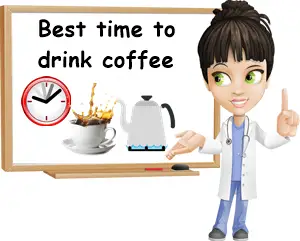Drinking coffee in the morning is a momentous ritual for the modern man and can, in fact, dictate how your day will go by. Drinking coffee can enhance and regulate productivity, mood, appetite, well being and normal body functions or upset the balance of how your body works. How it’s going to affect you and your productivity and health is dictated primarily by when you choose to drink your morning coffee. Because, believe it or not, there is a right and a wrong time to drink coffee and scientific reasoning for why it’s good to drink coffee at certain times of the day.
What is the best and worst time to drink coffee?
Say you wake up sometime between 6 or 7 a.m. You might not feel energized yet, but no worry, your body will start producing a hormone called cortisol to perk you up. Cortisol is known as the stress hormone and it keeps you alert, making drinking coffee unnecessary until around 9:30 or 10 in the morning. What you should actually do in the meantime is eat a good breakfast to supply you with nutrients that will give you energy. After about 10 a.m. your cortisol levels start to decline and you may have your cup of coffee to further keep you alert.

At noon, from around 12 to 13 p.m., your cortisol production peaks again. There is a good reason for cortisol levels increasing at this time of day: our ancestors would have had to hide from wild animals when it was daylight and find food by foraging or hunting to sustain themselves, so they needed the alertness to do so. From about 1:30 to 5 p.m. you can enjoy a coffee if you haven’t had the chance to yet, after which the body produces the last bout of cortisol from about 5:30 to 6:30 p.m. This should last your until nightfall.
As the brain registers the approach of dark, it will start preparing for the second part of the sleep-wake cycle, the sleeping part, by producing melatonin, the sleep hormone. Thus, the pineal gland in your brain produces melatonin to induce sleep. And because sleep is pivotal for good immunity, DNA repair and provides protection against disease and important antioxidant effects, you should get your rest and avoid coffee in the evening.
The best times to drink coffee during the day
- (8 a.m.-9 a.m.) You produce cortisol so you don’t need coffee right now.
- (9:30-11:30 a.m.) You may have coffee.
- (12:30-13:30 p.m.) You produce cortisol so no need to drink coffee.
- (13:30-17:00 p.m.) You may have coffee.
- (17:30-18:30 p.m.) You produce cortisol so you don’t need to drink coffee.
- No more coffee for you because it’s time to let your body prepare the body for sleep at night.

What are the disadvantages of drinking coffee at the wrong time?
Increased risk of cardiovascular distress, heart attack
High cortisol levels occur naturally in the morning at around 8-9 a.m. Most people wake up earlier and already have coffee, often black, or more than one cup, adding a strong stimulant to the alertness that comes naturally in the morning.
For those with existing cardiovascular conditions of the likes of hypertension or high blood pressure, palpitations, extrasystoles and other forms of arrhythmia, a history of heart attacks or strokes, drinking coffee first thing in the morning can spark significant cardiovascular distress and worsen existing cardiovascular stress. This increases risks of serious cardiovascular events and makes them more likely. Over time, drinking coffee, especially very early in the morning, can cause such conditions to develop, particularly in individuals with an elevated risk of cardiovascular disease.
The strong stimulating effect of coffee, the fact that most people prefer strong coffee, and often drink multiple cups a day, existing nutritional deficiencies (potassium and magnesium deficiency in particular), a high intake of sodium or salt, excess weight, the diuretic effect of coffee that sparks a chain of adverse effects for the cardiovascular system, all encourage the onset of cardiovascular disease and associated problems. Also read the 6 reasons why coffee is bad for you.
Nutritional deficiencies and dehydration
The first thing you should do in the morning is eat and drink water. Drinking coffee before breakfast causes dehydration and will impair the absorption of nutrients you take in from the breakfast you’ve postponed. Substituting a nutritious breakfast for coffee is even worse because it fully deprives you of essential nutrients you need to stay healthy and energized. And it’s likely you might not get those nutrients after all because a meal missed is often compensated by poor eating later on in the day.
Fatigue, physical and mental
Despite the initial bout of alertness, drinking a cup of coffee in the morning will not keep you energized and refreshed all day. As its effects wear off, you will start experiencing tiredness and lose your edge. Over time, this effect is magnified because coffee is known to limit the absorption of vitamins and minerals that give you actual energy. Also, the body tends to get used to caffeine and your tolerance to the stimulant effects of caffeine increases. Drinking more coffee in response might create an even greater tolerance to caffeine, amplify nutritional deficiencies, and lead to physical and mental fatigue as well as cardiovascular problems.
Bad for gastritis, stomach ulcers, acid reflux, IBS
Drinking coffee first thing in the morning on an empty stomach is bad for you if you have digestive disorders such as gastroesophageal reflux disease or GERD, also known as acid reflux disease, irritable bowel syndrome or IBS, gastritis or a peptic ulcer. Coffee on an empty stomach is known to worsen existing acid reflux, gastritis, ulcers, and even irritable bowel syndrome.
Discontinuing consumption for two to three months to allow the stomach lining to heal itself, avoiding strong coffee such as dark roast Robusta varieties and Robusta and Arabica blends, not drinking coffee every single day, and especially not drinking coffee on an empty stomach, as well as limiting intake to one cup of coffee a day may allow you to enjoy coffee with minimum side effects.
Causes irritability, insomnia, bad disposition, impaired productivity
Drinking coffee later in the afternoon or in the evening disrupts normal circadian rhythm by inducing alertness and competing with the effects of melatonin, dubbed the sleep hormone. This can result in side effects such as insomnia, headaches, irritability, low mood, decreased productivity, brain fog and an overall bad disposition.
Drinking coffee in the second part of the day has the potential to augment the symptoms and side effects of existing mental disorders such as anxiety and depression because the caffeine in coffee competes with melatonin and disrupts the body’s natural sleep cycle which causes insomnia and poor sleep followed by tiredness and impaired productivity the next day.
Conclusion
So what is the best time to drink coffee? Coffee is best drank at leisure, on a full stomach, after breakfast and before lunch, or sometime in the afternoon, before 5 p.m. Drinking coffee first thing in the morning is bad for you because that’s when your body is secreting high amounts of a hormone called cortisol that is naturally stimulant. Also, drinking coffee first thing in the morning on an empty stomach, before eating anything, is bad for your heart and stomach, especially if you are already dealing with hypertension, acid reflux or gastritis.
